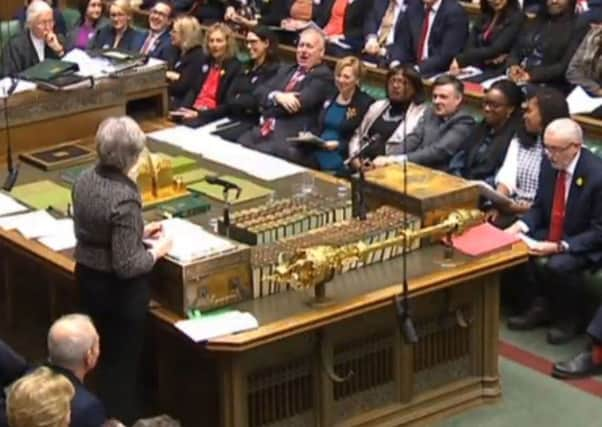Tom Hamilton: It's funny how PMQs is taken so seriously


Some people love it: the clash of ideas and policies, the cutting jokes and put-downs, the theatre.
Others hate it: the childish point-scoring, the failure to answer questions, the braying of the MPs who pack tightly onto the House of Commons’ green benches.
Advertisement
Hide AdAdvertisement
Hide AdMost political leaders who have taken part in the event are in the latter camp. For both the Prime Minister and the Leader of the Opposition, PMQs takes a huge amount of preparation, and carries a greater risk of humiliation than any other regular event in their diary.
It’s not a highlight of their week; it’s an ordeal they have to get through. At noon on a Wednesday, there’s almost anywhere they’d rather be. Even after they’ve left office, they remember the fear.
I helped prepare Labour leaders for PMQs from 2010 to 2016, working with Ed Miliband, Harriet Harman and Jeremy Corbyn.
With my former colleague, Ayesha Hazarika, I have written a new book on the experience, and on PMQs’ history, its tactics and the ways different leaders have approached it – Punch & Judy Politics: An Insiders’ Guide to Prime Minister’s Questions.
Advertisement
Hide AdAdvertisement
Hide AdFor advisers like me, the fear isn’t as great as it is for the leaders – I wasn’t the one risking ridicule on national television – but the pressure is still high. And before you write in, let me make your point for you: I’m perfectly well aware that in the time I was working on PMQs, my various bosses lost at least as often as they won.
For the book, we spoke to current and former politicians and advisers from all sides, including former Prime Ministers and former Leaders of the Opposition. Few of them had thought as hard about PMQs as William Hague, who devoted a huge amount of his time as Conservative leader after 1997 to preparing for the weekly joust with Tony Blair. This was partly, as he told us, because it was a way to restore some Tory morale: even if Labour had a majority of 179, at PMQs Hague could compete on equal terms and win some arguments.
Hague developed new question techniques and gave them names: the “rolling brief”, the “poisoned pincers”, the “multiple moving strike”. He studied Blair’s answers, noticing at one point that the Prime Minister had two folders, with briefing material ordered alphabetically, so he could ask his first question about a subject beginning with A, then a second about a subject from the second half of the alphabet, forcing Blair to switch from one file to the other.
He came up with jokes that even made Labour MPs laugh at themselves. And then, in 2001, he lost by a landslide. PMQs isn’t everything.
Advertisement
Hide AdAdvertisement
Hide AdIn Hague’s defence, he was up against an opponent, Tony Blair, who was also a strong PMQs performer, and who gave as good as he got. The quality has not always been so high. Few would argue that today’s clashes between Jeremy Corbyn and Theresa May are classic encounters. Corbyn’s long-winded, heavily-scripted questions, and May’s detailed but often flat responses, usually lack the spontaneity, the brevity and the wit of the best PMQs exchanges.
All politicians have strengths and weaknesses, and PMQs does not play to either May’s or Corbyn’s strengths. Corbyn has consistently performed better as a campaigner out in the country than in the Chamber of the House of Commons. May is at her most effective, so far as anyone can tell, in private.
But today’s admittedly low-key clashes only point to what PMQs could still be. Theresa May, at least as a PMQs performer, is eminently beatable. She has no majority; her government has yet to come to an agreement on what it wants Brexit to look like, let alone how to negotiate it; she has been forced to let go of ministers she would have preferred to keep and forced to keep ministers she would prefer to let go. Jeremy Corbyn has a significant strategic advantage, and PMQs is the perfect forum for him to press it home.
When Corbyn asked six questions in a row on Brexit for two weeks running recently, he put the Prime Minister under real pressure.
Advertisement
Hide AdAdvertisement
Hide AdBut too often, by skipping from subject to subject or asking questions that are too easy, he has allowed her to use PMQs as a release valve instead. Too often, he has been content to deliver a clip that will play well to his supporters on social media, at the expense of going for a win with a tight, forensic, difficult set of questions.
At its best, PMQs can be used by leaders not just to put the other side on the spot, but to test arguments, to define themselves and their opponents and to create moments that crystallise the political situation. Tony Blair labelling John Major as “Weak, weak, weak”. David Cameron contrasting his new leadership with Blair’s with “He was the future once”. Vince Cable summing up Gordon Brown’s transformation “from Stalin to Mr Bean”. Each of these delivered a political message with a tightness and brevity that would not have been possible anywhere else.
Most weeks, PMQs is less memorable than this. Still, every week, the potential is there. As Tony Blair told us: “If you’re going to have to do it, you might as well do it well, not badly.” That’s easier said than done. But, love it or hate it, PMQs is here to stay. That means that for our political leaders, it’s worth taking seriously.
Tom Hamilton is co-author, with Ayesha Hazarika, of Punch & Judy Politics: An Insiders’ Guide to Prime Minister’s Questions, published by Biteback, price £20. He was born in Wakefield and grew up in Leeds.